外研版高中英语必修四Module 2 Traffic Jam Grammar祈使句课件(共24张)
文档属性
| 名称 | 外研版高中英语必修四Module 2 Traffic Jam Grammar祈使句课件(共24张) | 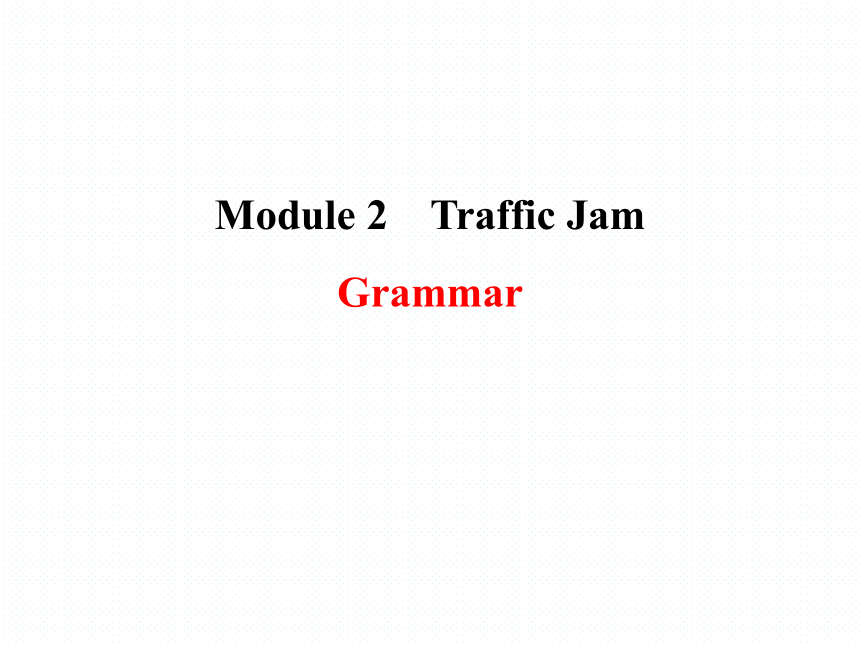 | |
| 格式 | zip | ||
| 文件大小 | 175.5KB | ||
| 资源类型 | 教案 | ||
| 版本资源 | 外研版 | ||
| 科目 | 英语 | ||
| 更新时间 | 2019-04-09 18:09:45 | ||
图片预览

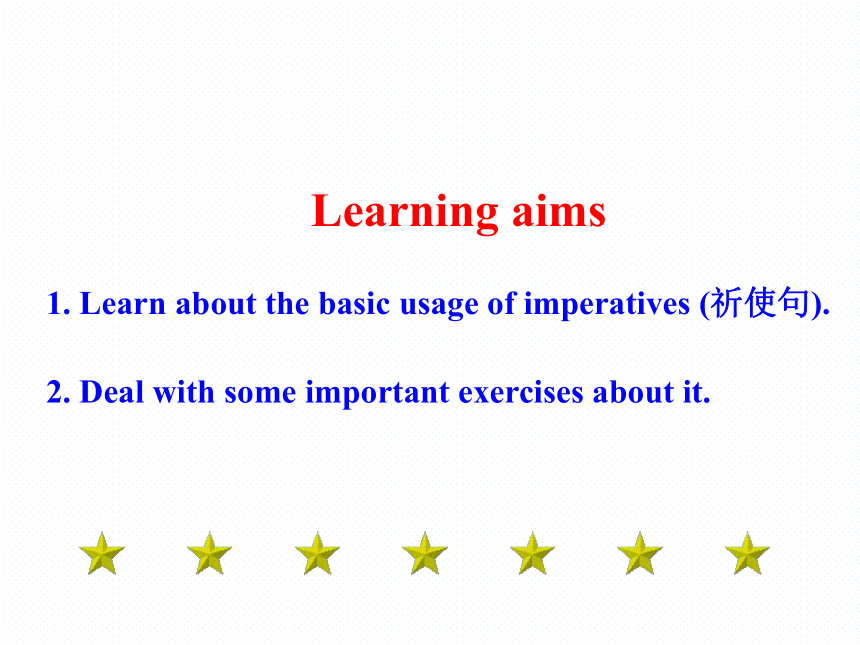
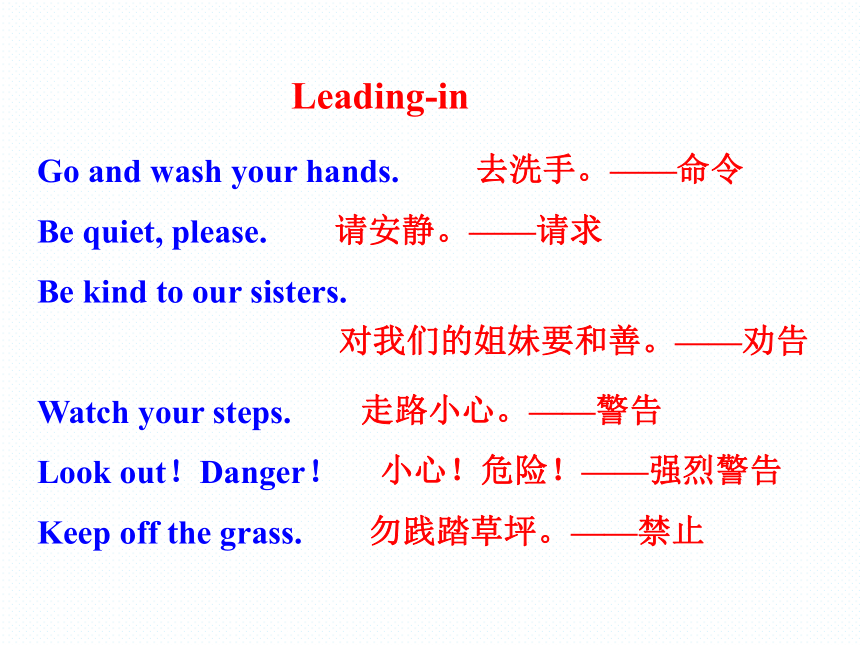
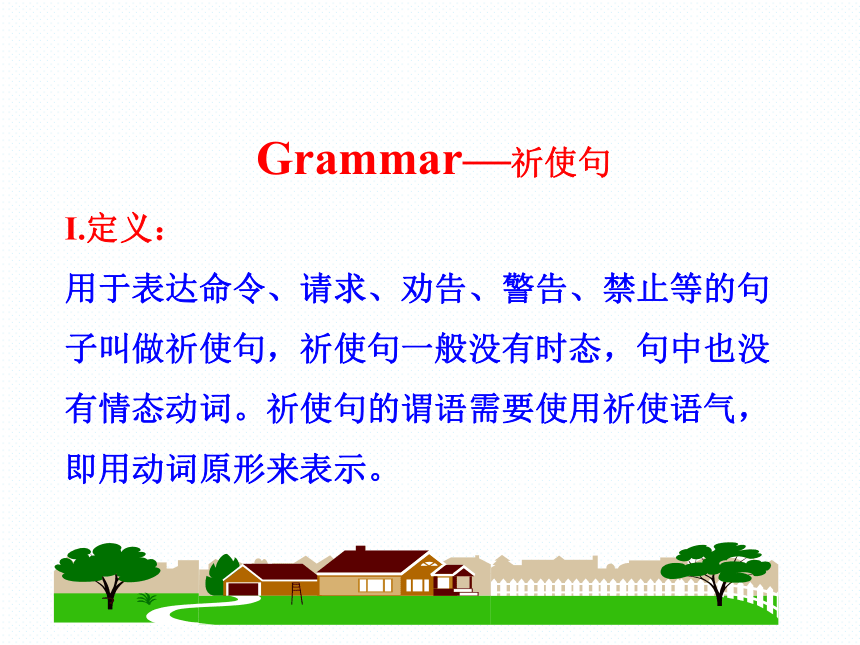
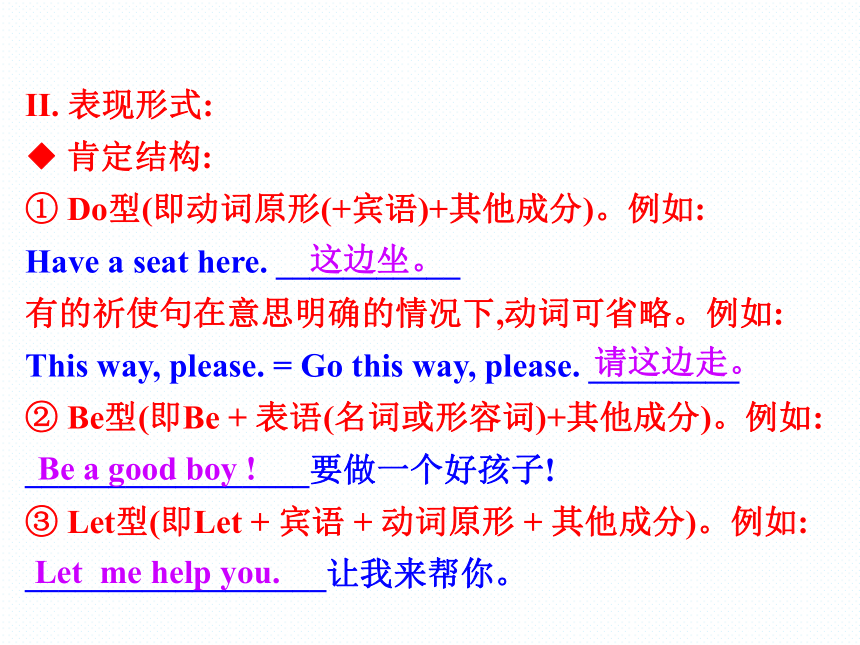
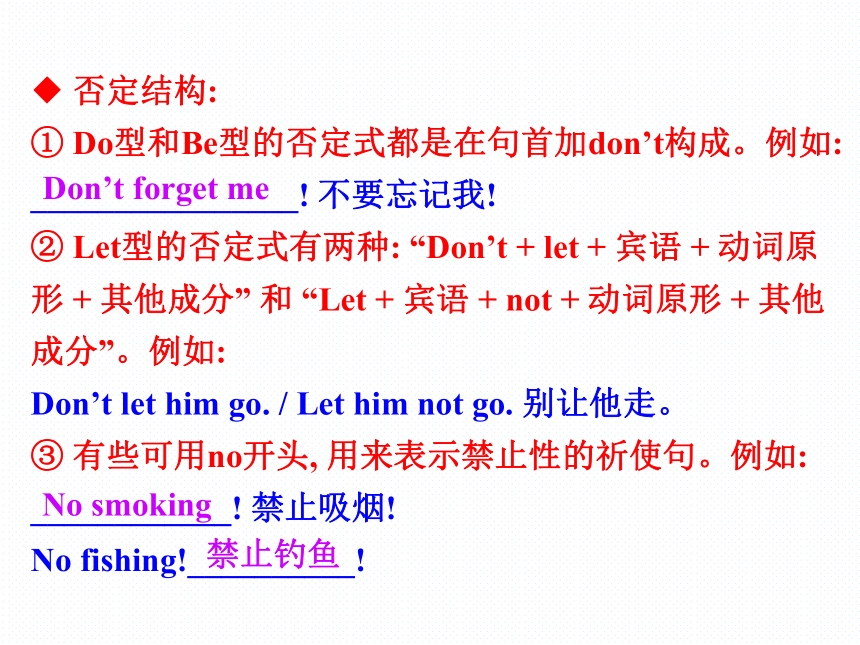
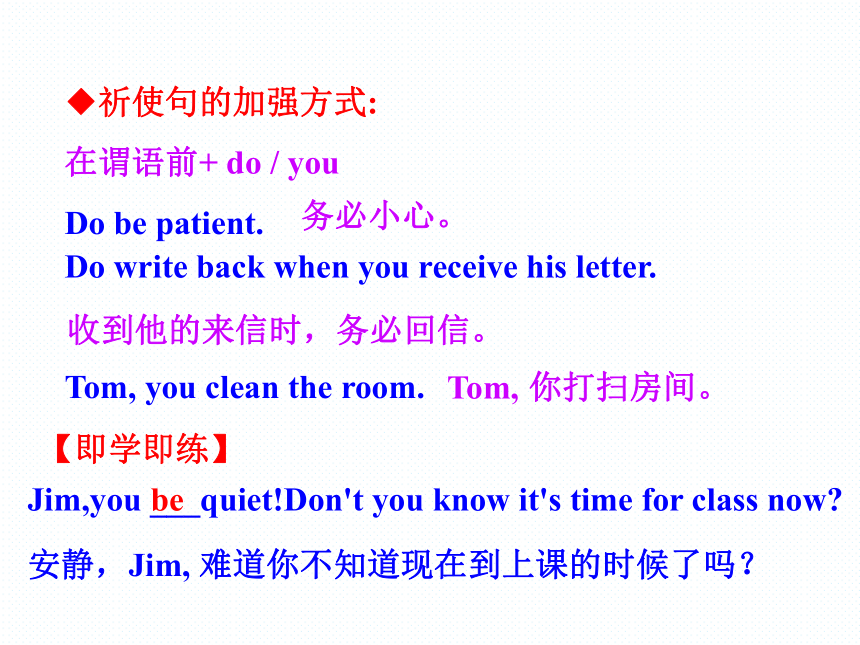
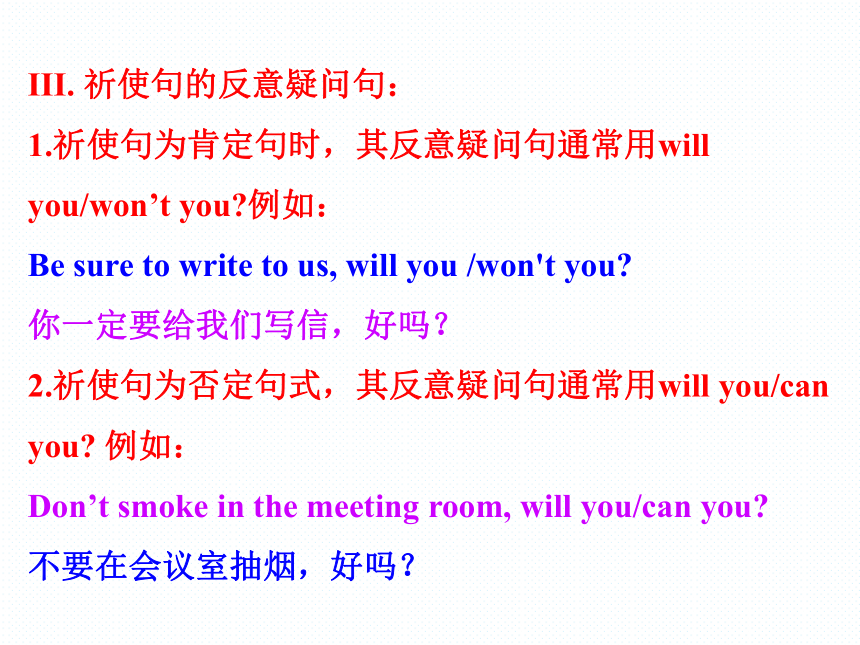
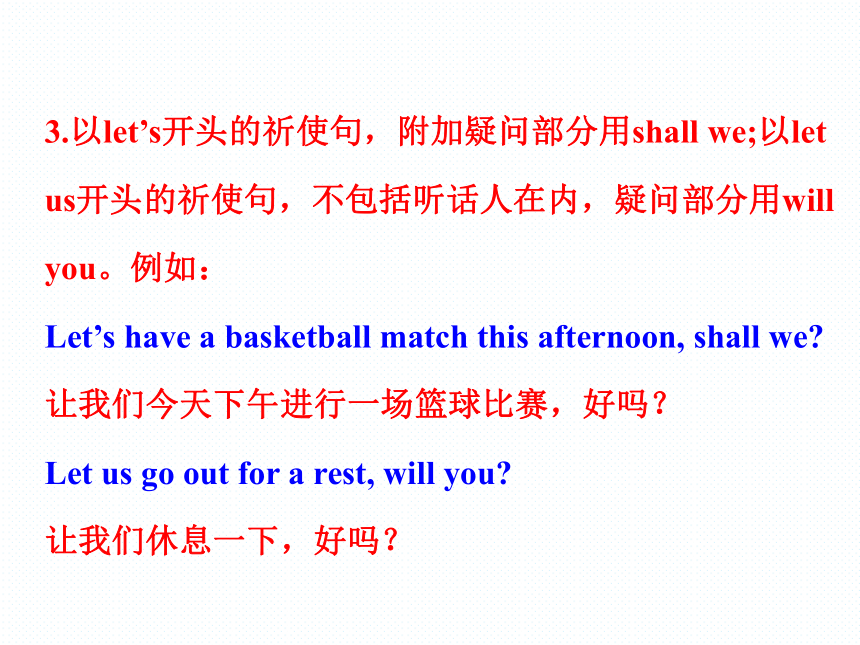
文档简介
课件24张PPT。Module 2 Traffic Jam
GrammarLearning aims
1. Learn about the basic usage of imperatives (祈使句).
2. Deal with some important exercises about it. Go and wash your hands.
Be quiet, please.
Be kind to our sisters.
Watch your steps.
Look out!Danger!
Keep off the grass. 去洗手。——命令请安静。——请求对我们的姐妹要和善。——劝告走路小心。——警告小心!危险!——强烈警告勿践踏草坪。——禁止Leading-inGrammar—祈使句
I.定义:
用于表达命令、请求、劝告、警告、禁止等的句子叫做祈使句,祈使句一般没有时态,句中也没有情态动词。祈使句的谓语需要使用祈使语气,即用动词原形来表示。II. 表现形式:
◆ 肯定结构:
① Do型(即动词原形(+宾语)+其他成分)。例如:
Have a seat here. ___________
有的祈使句在意思明确的情况下,动词可省略。例如:
This way, please. = Go this way, please. _________
② Be型(即Be + 表语(名词或形容词)+其他成分)。例如:
_________________要做一个好孩子!
③ Let型(即Let + 宾语 + 动词原形 + 其他成分)。例如:
__________________让我来帮你。 这边坐。请这边走。Be a good boy !Let me help you.◆ 否定结构:
① Do型和Be型的否定式都是在句首加don’t构成。例如:
________________! 不要忘记我!
② Let型的否定式有两种: “Don’t + let + 宾语 + 动词原
形 + 其他成分” 和 “Let + 宾语 + not + 动词原形 + 其他
成分”。例如:
Don’t let him go. / Let him not go. 别让他走。
③ 有些可用no开头, 用来表示禁止性的祈使句。例如:
____________! 禁止吸烟!
No fishing!__________! Don’t forget meNo smoking禁止钓鱼◆祈使句的加强方式:
在谓语前+ do / you
Do be patient.
Do write back when you receive his letter.
Tom, you clean the room.
务必小心。Tom, 你打扫房间。收到他的来信时,务必回信。Jim,you ___quiet!Don't you know it's time for class now?【即学即练】be安静,Jim, 难道你不知道现在到上课的时候了吗?III. 祈使句的反意疑问句:
1.祈使句为肯定句时,其反意疑问句通常用will you/won’t you?例如:
Be sure to write to us, will you /won't you?
你一定要给我们写信,好吗?
2.祈使句为否定句式,其反意疑问句通常用will you/can you? 例如:
Don’t smoke in the meeting room, will you/can you?
不要在会议室抽烟,好吗?3.以let’s开头的祈使句,附加疑问部分用shall we;以let us开头的祈使句,不包括听话人在内,疑问部分用will you。例如:
Let’s have a basketball match this afternoon, shall we?
让我们今天下午进行一场篮球比赛,好吗?
Let us go out for a rest, will you?
让我们休息一下,好吗?【即学即练】1.Have a cup of tea,___________________?喝杯茶,好吗?won't you / will you2.Don't go out alone after dark,________?will you天黑后不要单独外出,好吗?IV.带主语的祈使句常用于下面几种情况:
(1)当说话人要求不同的人做不同的事时。例如:
You go to telephone the police for help while Mary and I stay here to look after the injured.
你去向警察打电话求助,Mary和我待在这儿照顾伤员。
(2)当说话人是上级对下级或长辈对晚辈时。例如:
You listen to your parents at home.
在家要听父母的话。
(3) 当祈使句的谓语部分有副词up, down, in, out, off, away,且副词位于句首时。例如:
Out you go. 你出去。 (2018·全国卷Ⅱ)So _______ my delight when he
emailed me saying he wanted to come to visit me.
A. to imagine B. to have imagined
C. imagine D. have imagined
【高考链接】【解题关键】考查祈使句。句意:所以当他给我发邮件说要来看我时想象一下我多么高兴。主句是祈使句So imagine my delight, ,以动词原形开头;when引导一个时间状语从句。Hurry up and you will catch the last bus.Study hard or you’ll not pass the exam.如果你给那些小树多浇点水,它们就不会死了。V. 祈使句+and /or +陈述句,相当于条件句。
有时,“名词词组+and/or+陈述句”也有相同的作用。例如:
If you hurry up, you will catch the last bus.=
___________________________________
If you don’t study hard, you’ll not pass the exam.
__________________________________
More water and the young trees couldn’t have died.
___________________________________________ Ⅵ. 高考考点总结:
祈使句通常用来表示命令、请求、禁止、建议、警告等语气,是高考的热点之一。分析历年高考试题,可以看出主要是对以下几个方面进行考查:(一) 对祈使句谓语动词形式的考查
1. If you have a job,_______ (devote) yourself to it
and finally you’ll succeed.
2. _______ (knock) at the door before entering, please.
devote Knock(二)对祈使句的反意疑问句的考查
1. When you’ve finished with that book, don’t forget to put it back on the shelf, ___________?
2.We forget to bring our tickets, but please let us enter, _________?
3.It’s a fine day. Let’s go fishing, _________?
will youwill youshall we (三)对祈使句的应答语的考查
1. —Don’t forget to come to my birthday party tomorrow.
—__________(I don’tI won’t ).
2. —Write to me when you get home.
—__________(I willI can).
【点 津】从语句交际意义入手,排除Don’t/Do/Be等应答的定式干扰,祈使句的应答常用:I will / I won’t。I won’tI will
1.Tom, get up early tomorrow morning, ______we
will be late for the train. 2.Turn on the television or _______(open) a magazine, and then you will often see a lot of advertisements. openⅠ.单句语法填空。Class exercisesor 3.__________(sleep) late in the morning, Bob turned off the alarm.【点 津】牢记常见祈使句结构,注重标点符号的功用,排除非谓语动词的干扰。非谓语动词提前作状语,常用逗号与后面分开,说明后面情况发生的时间、原因、条件、目的等。To sleep1. Mary, _____here—everybody else, stay where you are.
A. come B. comes
C. to come D. coming
2.—Alice, you feed bird today, _____?
—But I fed it yesterday.
do you B. will you
C. didn’t you D. don’t youⅡ单项选择3. —The new windows need washing.
—Well, let’s wash them together, _____?
A. shall we B. will you
C. should we D. would you
4.— Sorry, I’m not feeling well and I don’t think I can finish it.
—Don’t worry. Let us do it for you, _____?
A. will you B. shall we
C. shan’t we D. shall you 5. Don’t be discouraged. _____ things as they are and you will enjoy every day of your life.
A. Taking B. To take C. Take D. Taken
6.Catherine, _____ up early tomorrow morning, or we will be late for the train.
A. getting B. gets C. get D. to get7. _______,and I will hit you.
A. If you say that again B. Say that again
C. Saying that again D. You will say that again
8.______on the television or _______a magazine, and then you will often see a lot of advertisements.
A. Turning; open B. Turn; opening
C. Turn; open D. Turning; openingHomeworkGo over the grammar that we have learned this class!
GrammarLearning aims
1. Learn about the basic usage of imperatives (祈使句).
2. Deal with some important exercises about it. Go and wash your hands.
Be quiet, please.
Be kind to our sisters.
Watch your steps.
Look out!Danger!
Keep off the grass. 去洗手。——命令请安静。——请求对我们的姐妹要和善。——劝告走路小心。——警告小心!危险!——强烈警告勿践踏草坪。——禁止Leading-inGrammar—祈使句
I.定义:
用于表达命令、请求、劝告、警告、禁止等的句子叫做祈使句,祈使句一般没有时态,句中也没有情态动词。祈使句的谓语需要使用祈使语气,即用动词原形来表示。II. 表现形式:
◆ 肯定结构:
① Do型(即动词原形(+宾语)+其他成分)。例如:
Have a seat here. ___________
有的祈使句在意思明确的情况下,动词可省略。例如:
This way, please. = Go this way, please. _________
② Be型(即Be + 表语(名词或形容词)+其他成分)。例如:
_________________要做一个好孩子!
③ Let型(即Let + 宾语 + 动词原形 + 其他成分)。例如:
__________________让我来帮你。 这边坐。请这边走。Be a good boy !Let me help you.◆ 否定结构:
① Do型和Be型的否定式都是在句首加don’t构成。例如:
________________! 不要忘记我!
② Let型的否定式有两种: “Don’t + let + 宾语 + 动词原
形 + 其他成分” 和 “Let + 宾语 + not + 动词原形 + 其他
成分”。例如:
Don’t let him go. / Let him not go. 别让他走。
③ 有些可用no开头, 用来表示禁止性的祈使句。例如:
____________! 禁止吸烟!
No fishing!__________! Don’t forget meNo smoking禁止钓鱼◆祈使句的加强方式:
在谓语前+ do / you
Do be patient.
Do write back when you receive his letter.
Tom, you clean the room.
务必小心。Tom, 你打扫房间。收到他的来信时,务必回信。Jim,you ___quiet!Don't you know it's time for class now?【即学即练】be安静,Jim, 难道你不知道现在到上课的时候了吗?III. 祈使句的反意疑问句:
1.祈使句为肯定句时,其反意疑问句通常用will you/won’t you?例如:
Be sure to write to us, will you /won't you?
你一定要给我们写信,好吗?
2.祈使句为否定句式,其反意疑问句通常用will you/can you? 例如:
Don’t smoke in the meeting room, will you/can you?
不要在会议室抽烟,好吗?3.以let’s开头的祈使句,附加疑问部分用shall we;以let us开头的祈使句,不包括听话人在内,疑问部分用will you。例如:
Let’s have a basketball match this afternoon, shall we?
让我们今天下午进行一场篮球比赛,好吗?
Let us go out for a rest, will you?
让我们休息一下,好吗?【即学即练】1.Have a cup of tea,___________________?喝杯茶,好吗?won't you / will you2.Don't go out alone after dark,________?will you天黑后不要单独外出,好吗?IV.带主语的祈使句常用于下面几种情况:
(1)当说话人要求不同的人做不同的事时。例如:
You go to telephone the police for help while Mary and I stay here to look after the injured.
你去向警察打电话求助,Mary和我待在这儿照顾伤员。
(2)当说话人是上级对下级或长辈对晚辈时。例如:
You listen to your parents at home.
在家要听父母的话。
(3) 当祈使句的谓语部分有副词up, down, in, out, off, away,且副词位于句首时。例如:
Out you go. 你出去。 (2018·全国卷Ⅱ)So _______ my delight when he
emailed me saying he wanted to come to visit me.
A. to imagine B. to have imagined
C. imagine D. have imagined
【高考链接】【解题关键】考查祈使句。句意:所以当他给我发邮件说要来看我时想象一下我多么高兴。主句是祈使句So imagine my delight, ,以动词原形开头;when引导一个时间状语从句。Hurry up and you will catch the last bus.Study hard or you’ll not pass the exam.如果你给那些小树多浇点水,它们就不会死了。V. 祈使句+and /or +陈述句,相当于条件句。
有时,“名词词组+and/or+陈述句”也有相同的作用。例如:
If you hurry up, you will catch the last bus.=
___________________________________
If you don’t study hard, you’ll not pass the exam.
__________________________________
More water and the young trees couldn’t have died.
___________________________________________ Ⅵ. 高考考点总结:
祈使句通常用来表示命令、请求、禁止、建议、警告等语气,是高考的热点之一。分析历年高考试题,可以看出主要是对以下几个方面进行考查:(一) 对祈使句谓语动词形式的考查
1. If you have a job,_______ (devote) yourself to it
and finally you’ll succeed.
2. _______ (knock) at the door before entering, please.
devote Knock(二)对祈使句的反意疑问句的考查
1. When you’ve finished with that book, don’t forget to put it back on the shelf, ___________?
2.We forget to bring our tickets, but please let us enter, _________?
3.It’s a fine day. Let’s go fishing, _________?
will youwill youshall we (三)对祈使句的应答语的考查
1. —Don’t forget to come to my birthday party tomorrow.
—__________(I don’tI won’t ).
2. —Write to me when you get home.
—__________(I willI can).
【点 津】从语句交际意义入手,排除Don’t/Do/Be等应答的定式干扰,祈使句的应答常用:I will / I won’t。I won’tI will
1.Tom, get up early tomorrow morning, ______we
will be late for the train. 2.Turn on the television or _______(open) a magazine, and then you will often see a lot of advertisements. openⅠ.单句语法填空。Class exercisesor 3.__________(sleep) late in the morning, Bob turned off the alarm.【点 津】牢记常见祈使句结构,注重标点符号的功用,排除非谓语动词的干扰。非谓语动词提前作状语,常用逗号与后面分开,说明后面情况发生的时间、原因、条件、目的等。To sleep1. Mary, _____here—everybody else, stay where you are.
A. come B. comes
C. to come D. coming
2.—Alice, you feed bird today, _____?
—But I fed it yesterday.
do you B. will you
C. didn’t you D. don’t youⅡ单项选择3. —The new windows need washing.
—Well, let’s wash them together, _____?
A. shall we B. will you
C. should we D. would you
4.— Sorry, I’m not feeling well and I don’t think I can finish it.
—Don’t worry. Let us do it for you, _____?
A. will you B. shall we
C. shan’t we D. shall you 5. Don’t be discouraged. _____ things as they are and you will enjoy every day of your life.
A. Taking B. To take C. Take D. Taken
6.Catherine, _____ up early tomorrow morning, or we will be late for the train.
A. getting B. gets C. get D. to get7. _______,and I will hit you.
A. If you say that again B. Say that again
C. Saying that again D. You will say that again
8.______on the television or _______a magazine, and then you will often see a lot of advertisements.
A. Turning; open B. Turn; opening
C. Turn; open D. Turning; openingHomeworkGo over the grammar that we have learned this class!
